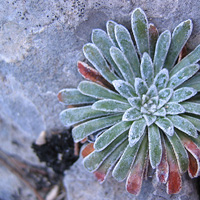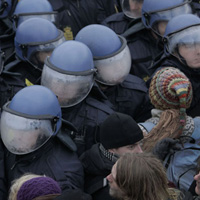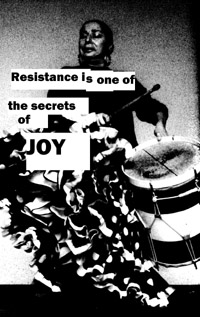effective-sustainable activism
sustaining resistance – empowering renewal
Sustaining Resistance: Empowering Renewal is a project coordinated by the Ecodharma Centre. It aims to support awareness and change at both the personal and inter-personal levels to enable more effective and sustainable activism. It seeks to foster forms of community organizing and activism that nourish, inspire and empower people, in ways that are personally sustainable and contribute to long-term movement building.
Who is this work aimed at? Anyone with ongoing experience of action for social change: those involved in direct action, ongoing campaign work, community empowerment and anyone involved in socially engaged action addressing ecological, political and social justice issues. We consider activism to include: Resistance – action preventing further damage to ecosystems and social justice; Renewal – action focused on developing and creating alternatives for healthier societies and communities; and Building Resilience – action supporting increased resilience in communities to weather the uncertain times ahead.
We are running workshops and developing resources that:
- Explore methods of working effectively with the personal and inner dimension of activism, helping us take better care of ourselves, equipping us to avoid burnout and to better empower ourselves for action.
- Offer tools which support more skilful inter-personal work in activist groups and networks, and enable ways of organising which exemplify the values they want to realise in the world.
- Create frameworks and spaces which facilitate deep reflection, analysis, and the sharing of experience of the personal and interpersonal dimensions of our activism – enabling us to draw nourishment, learning, and inspiration from each other and nature.
The personal and inner dimension
A key aspect of the project explores how to work effectively with the personal and inner dimension of activism. This focus complements the approach of some of our partners’ activist education and training work, which tends to concentrate on skills acquisition and the provision of tools and techniques.
Attending to the personal and inner aspect of our experience is essential for an activism that is both effective and sustainable. Failure to look at these aspects of our activism leads repeatedly to talented and committed activists falling by the wayside, the hemorrhaging of experience from our movements, and the unnecessary drain of energy dealing with inflexibility and avoidable conflicts in our groups.
Drawing on our own experience, and the shared experience of those we work with, we have seen that the sustainability of social action is complex, involving an ongoing and potentially lifelong attention to our passion and motivation, emotional wellbeing, the ways we construct our identity, manage our energy, our self-esteem and the balancing of competing needs.
 Clearly there are enormous challenges in consistently facing and seeking to transform pressing ecological and social problems. These challenges are both material and psychological. At one level we need to work out how we maintaining a livelihood, find material resources for our work, as well as dealing with repression and sometimes drawn-out legal processes. At the other level, we find ourselves working with the sense of loss, grief, despair, pain, anger and numbness that consistent openness and responsiveness to the state of the world can bring.
Clearly there are enormous challenges in consistently facing and seeking to transform pressing ecological and social problems. These challenges are both material and psychological. At one level we need to work out how we maintaining a livelihood, find material resources for our work, as well as dealing with repression and sometimes drawn-out legal processes. At the other level, we find ourselves working with the sense of loss, grief, despair, pain, anger and numbness that consistent openness and responsiveness to the state of the world can bring.
Sometimes we have to stop and reflect, rethink and regroup. Sustaining Resistance workshops help to provide that space. They also provide tools and methods that enable us to build a balanced and sustainable practice into our ongoing work, which honours the challenges while keeping us in touch with our inspiration.
The methods we use from holistic and participatory education, facilitate deep reflection on our personal histories and experiences of activism. This supports increasing self-awareness and greater capacity to learn from ourselves and each other.
 In addition to increased self-awareness, we offer tools supporting psychological integration and a growing emotional resilience. Working on these three qualities, awareness, integration and emotional resilience, establishes a crucial foundation to sustainable activist practice. They not only help us take better care of ourselves and equip ourselves to avoid burnout, but can also give us more flexibility, clarity, and access to deeper resources in ourselves which better empowers us for action.
In addition to increased self-awareness, we offer tools supporting psychological integration and a growing emotional resilience. Working on these three qualities, awareness, integration and emotional resilience, establishes a crucial foundation to sustainable activist practice. They not only help us take better care of ourselves and equip ourselves to avoid burnout, but can also give us more flexibility, clarity, and access to deeper resources in ourselves which better empowers us for action.
The inter-personal dimension
In our activist lives, there is a continuous interplay between the personal and interpersonal. A continuous flow of influence runs between these two dimensions. Who we are and how we approach our activism is influenced by the group cultures we function within. Likewise, those group cultures grow out of what each of us brings to them. Helpful change can come from either of these dimensions, the personal or interpersonal, but is most effective when we work at both levels simultaneously.
 So, Sustaining Resistance offers tools which support more skilful inter-personal work in our groups and networks, and enable ways of organising which exemplify the values we want to realise in the world. These can help us replace vicious cycles, like the way burnout and internal group conflicts exacerbate each other, with virtuous cycles in groups skilled in generating mutual understanding and support. The basic tools include looking at ways of organising and facilitation, effective decision making, exploring gross and subtle power dynamics, key communication and listening skills, as well as approaches to conflict transformation and mediation.
So, Sustaining Resistance offers tools which support more skilful inter-personal work in our groups and networks, and enable ways of organising which exemplify the values we want to realise in the world. These can help us replace vicious cycles, like the way burnout and internal group conflicts exacerbate each other, with virtuous cycles in groups skilled in generating mutual understanding and support. The basic tools include looking at ways of organising and facilitation, effective decision making, exploring gross and subtle power dynamics, key communication and listening skills, as well as approaches to conflict transformation and mediation.
With people who already have a basic grasp of these kinds of organising tools and approaches, we try to support an increase in their skill base, an enriched understanding of the values and principles that underlie these methods, and a greater confidence to use them. And we see a clear increase in capacity to work with these kinds of tools enhanced by the work at the personal level.
 We want to equip people to carry their learning back into the groups and networks they operate in. Building sustainable practices into the culture of our movements, affinity groups, and projects is itself no easy task. Adding longevity, flexibility and resilience into our collective practice can involve challenging elements of cultures we participate in. It includes supporting individuals to take guilt free time out and explore changes in their mode of participation. It can mean finding new sources of energy and drive and not only depending only on transitory bursts of youthful rage. It involves balancing enthusiastic initiative with a slow developing maturity, fostering intergenerational learning, building consistent and functional relationships, and maintaining safe spaces and communities from which to organize.
We want to equip people to carry their learning back into the groups and networks they operate in. Building sustainable practices into the culture of our movements, affinity groups, and projects is itself no easy task. Adding longevity, flexibility and resilience into our collective practice can involve challenging elements of cultures we participate in. It includes supporting individuals to take guilt free time out and explore changes in their mode of participation. It can mean finding new sources of energy and drive and not only depending only on transitory bursts of youthful rage. It involves balancing enthusiastic initiative with a slow developing maturity, fostering intergenerational learning, building consistent and functional relationships, and maintaining safe spaces and communities from which to organize.
Sustaining Resistance represents a vision of a balanced way of living that integrates values, work and strong action, with caring for ourselves, one another and the planet we inhabit. It seeks to support sustainable and radical action towards social change and ecological preservation, without losing sight of quality of life and joy in the lives of those involved in these struggles.
 Empowering Renewal breaks down the separation between personal and social liberation, between ´inner´ and ´outer´ work. It involves living out our beliefs in our day to day lives, learning to value those efforts, and to see ourselves as part of the change. It is about developing a model of active participation that does not idolize self sacrifice, does not avoid the emotional consequences of participation, does not perpetuate emotional hardening and cynicism, does not think ´burnout is cool and dedicated, and is fixated solely on outcomes and strategy – forgetting to celebrate along the way. Instead it honours a vision of a balanced and yet radical way of working for social change that allows for self and mutual care in our groups, that honours pain and vulnerability, honours a range of different ways of working over our life spans, and where having a rich and fulfilling life is part of the deal.
Empowering Renewal breaks down the separation between personal and social liberation, between ´inner´ and ´outer´ work. It involves living out our beliefs in our day to day lives, learning to value those efforts, and to see ourselves as part of the change. It is about developing a model of active participation that does not idolize self sacrifice, does not avoid the emotional consequences of participation, does not perpetuate emotional hardening and cynicism, does not think ´burnout is cool and dedicated, and is fixated solely on outcomes and strategy – forgetting to celebrate along the way. Instead it honours a vision of a balanced and yet radical way of working for social change that allows for self and mutual care in our groups, that honours pain and vulnerability, honours a range of different ways of working over our life spans, and where having a rich and fulfilling life is part of the deal.
Many of us have seen how cycles of burnout, dropout, and disillusionment weaken and fragment our present day struggles. Sustaining Resistance is about supporting a growing network of activists who take these dimensions of their work seriously, and through their own contributions and interventions help bring about a strengthening of activist culture at this time of real need. In this way we can build movements for social change that are resilient, effective and genuinely participatory. Sustaining Resistance is more than a course on avoiding burnout, it is a call for a way of being active that reflects and exemplifies the kind of world we want to live in, now.
Sustaining Resistance: Empowering Renewal – the course
 The core of the project is the Sustaining Resistance: Empowering Renewal 9 day course we run here at Ecodharma twice yearly. The course is situated within an overall context of ecological sensitivity, community life and simple living off the land, held by the stunning natural beauty and silence of the valley in which the centre is located.
The core of the project is the Sustaining Resistance: Empowering Renewal 9 day course we run here at Ecodharma twice yearly. The course is situated within an overall context of ecological sensitivity, community life and simple living off the land, held by the stunning natural beauty and silence of the valley in which the centre is located.
The workshop creates a participatory learning environment incorporating exercises, discussions, presentations, and often solo time in wild nature. These focus around significant topics of concern, with emphasis following the needs the participant group help us to identify and explore. The topics include sustainable activism, understanding burnout, trauma support, group processes and power dynamics, communication and listening tools, issues surrounding personal and group identity, activist culture, mutual care and self care, conflict engagement and working with external repression.
It draws on popular education and holistic learning, deep and radical ecology, as well as tools derived from the Buddhist tradition, reframed so as to free them of unnecessary ‘religious’ baggage.
Reflecting the overall project aims listed above the specific aims of the Sustaining Resistance, Empowering Renewal workshop are:
- To explore methods of working effectively with the personal and inner dimension of activism, helping us take better care of ourselves, equipping us to avoid burnout and to better empower ourselves for action.
- To offer tools which support more skilful inter-personal work in our groups and networks, and enable ways of organising which exemplify the values we want to realise in the world.
- To create a vibrant and supportive temporary community of activists, as a safe space for deep reflection, analysis, and the sharing of experience of the personal and interpersonal dimensions of our work – drawing nourishment and inspiration from each other and nature.
So, the workshop help participants to:
1.1 Gain an increased awareness of the importance of self-care and be better equipped to incorporate it in your life.
1.2 Learn ways of developing greater personal balance, clarity, inspiration, and resilience – including the use of inner work such as meditation.
1.3 Explore issues and techniques relevant to managing your energy, fears, frustrations, despair, and despondency – and become better able to avoid emotional hardening and cynicism.
2.1 Increase your understanding of group-work skills, including communication skills and ways of working with conflict.
2.2 Gain experience of methods of organising and community building, such as consensus-building and decision making, and explore the underlying values they express.
2.3 Examine issues around empowerment, leadership, understanding power dynamics and collective processes.
3.1 Reflect deeply on your own personal history of activism, identifying patterns and tendencies, and find ways of skilfully transforming these where needed.
3.2 Identify and draw upon the sources of nourishment and inspiration that support your engagement and help you realise your potential as an organiser and empowered agent for social change.
Other developments
Over the last few years, we have been building steadily on our experience of this work and are developing a wider program of trainings and courses. In response to demand and popularity, and as we build up our team of co-facilitators, we are now running courses in other locations around Europe. These collaborations currently include Seeds for Change in the UK, the European Youth for Action network in Berlin, amongst others. The work is expanding rapidly and generating much welcome interest, collaboration and participation.
We try to access funding to offer places to activists who need it for free or for a small voluntary donation. If you have any new funding leads that could support this work, or perhaps could make a donation to support this work yourself please contact us or make a contribution.
Sustaining Resistance: Empowering Renewal Workshop
Sustaining Resistance Resources
Self + Society: A Radical Response
